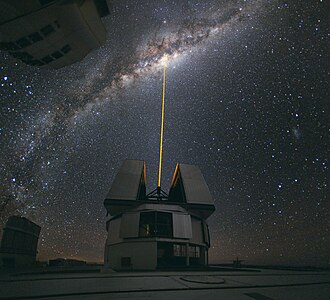Astronomy
Astronomy is the scientific study of celestial objects (such as stars, planets, comets, nebulae, star clusters, and galaxies) and phenomena that originate outside the Earth's atmosphere (such as the cosmic background radiation). It is concerned with the evolution, physics, chemistry, meteorology, and motion of celestial objects, as well as the formation and development of the universe.
Astronomy is one of the oldest sciences. Early civilizations, including the Babylonians, Greeks, Indians, Egyptians, Nubians, Iranians, Chinese, and Maya, performed methodical observations of the night sky for religious and ceremonial purposes and to navigate and predict the occurrence of seasons. Today, astronomy is divided into several branches: observational astronomy and theoretical astronomy. Observational astronomy focuses on acquiring and analyzing data, using basic principles of physics. Theoretical astronomy aims to explain observational results and predict what might happen. Both branches complement each other, with theoretical astronomy seeking to explain the observational results, and observations being used to confirm theoretical results.
Branches of Astronomy
Astronomy is a broad discipline that can be divided into several branches:
- Astrophysics: The branch of astronomy that deals with the physics of the universe, including the physical properties (luminosity, density, temperature, and chemical composition) of celestial bodies.
- Celestial Mechanics: The study of the motions and gravitational forces of celestial objects.
- Cosmology: The study of the universe as a whole, including its origins, evolution, and ultimate fate.
- Exoplanetology: The study of planets outside our solar system.
- Stellar Astronomy: The study of stars, including their formation, evolution, and death.
- Galactic Astronomy: The study of our galaxy, the Milky Way, and its structure and components.
- Extragalactic Astronomy: The study of objects beyond our galaxy, including other galaxies and galaxy clusters.
Observational Astronomy
Observational astronomy uses telescopes and other astronomical instruments to observe celestial objects. Major areas of focus include:
- Optical Astronomy: The study of celestial objects in the visible spectrum.
- Radio Astronomy: The study of celestial objects in the radio frequency spectrum.
- Infrared Astronomy: The study of celestial objects in the infrared spectrum.
- Ultraviolet Astronomy: The study of celestial objects in the ultraviolet spectrum.
- X-ray Astronomy: The study of celestial objects in the X-ray spectrum.
- Gamma-ray Astronomy: The study of celestial objects in the gamma-ray spectrum.
Theoretical Astronomy
Theoretical astronomy involves the development of computer or analytical models to describe astronomical objects and phenomena. The goals are to explain existing observations and predict new phenomena. Theories of stellar evolution, galaxy formation, cosmology, and dark matter are examples of the work in this field.
Importance of Astronomy
Astronomy has contributed to many important discoveries and technologies. For example, the understanding of gravity was significantly advanced by the work of astronomers. Astronomy also plays a crucial role in the development of calendars, the understanding of Earth's place in the universe, and the development of navigation techniques and technology. Furthermore, it continues to contribute to our understanding of fundamental physics through observations of extreme conditions in space.
See Also
Transform your life with W8MD's budget GLP-1 injections from $125.
W8MD offers a medical weight loss program to lose weight in Philadelphia. Our physician-supervised medical weight loss provides:
- Most insurances accepted or discounted self-pay rates. We will obtain insurance prior authorizations if needed.
- Generic GLP1 weight loss injections from $125 for the starting dose.
- Also offer prescription weight loss medications including Phentermine, Qsymia, Diethylpropion, Contrave etc.
NYC weight loss doctor appointments
Start your NYC weight loss journey today at our NYC medical weight loss and Philadelphia medical weight loss clinics.
- Call 718-946-5500 to lose weight in NYC or for medical weight loss in Philadelphia 215-676-2334.
- Tags:NYC medical weight loss, Philadelphia lose weight Zepbound NYC, Budget GLP1 weight loss injections, Wegovy Philadelphia, Wegovy NYC, Philadelphia medical weight loss, Brookly weight loss and Wegovy NYC
|
WikiMD's Wellness Encyclopedia |
| Let Food Be Thy Medicine Medicine Thy Food - Hippocrates |
Medical Disclaimer: WikiMD is not a substitute for professional medical advice. The information on WikiMD is provided as an information resource only, may be incorrect, outdated or misleading, and is not to be used or relied on for any diagnostic or treatment purposes. Please consult your health care provider before making any healthcare decisions or for guidance about a specific medical condition. WikiMD expressly disclaims responsibility, and shall have no liability, for any damages, loss, injury, or liability whatsoever suffered as a result of your reliance on the information contained in this site. By visiting this site you agree to the foregoing terms and conditions, which may from time to time be changed or supplemented by WikiMD. If you do not agree to the foregoing terms and conditions, you should not enter or use this site. See full disclaimer.
Credits:Most images are courtesy of Wikimedia commons, and templates, categories Wikipedia, licensed under CC BY SA or similar.
Contributors: Prab R. Tumpati, MD





